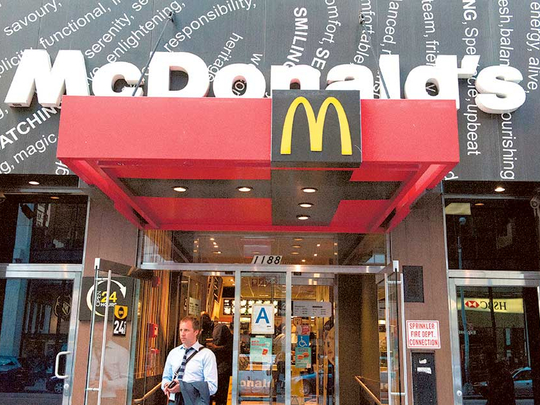
New York: McDonald’s Corp, the world’s biggest restaurant chain, reported same-store sales growth that missed analysts’ estimates, stoking concerns that the US fast-food industry is heading into a recession.
Same-store sales grew 3.1 per cent globally, the Oak Brook, Illinois-based company said in a statement Tuesday. Analysts projected a 3.6 per cent increase on average, according to Consensus Metrix.
Analysts such as Stifel Financial Corp’s Paul Westra have raised concerns that the restaurant sector is hitting a downturn, a harbinger for a broader economic slump in the US next year. Fast-food rivals such as Wendy’s Co also are piling on discounts and promotions, putting pressure on McDonald’s to keep prices low. That’s undercut the benefit of adding all-day breakfast in the US last year.
“The overall industry got weaker, and clearly McDonald’s felt some of that,” said Peter Saleh, an analyst at BTIG LLC in New York. “It was not a great quarter, especially on the US side.”
The shares fell as much as 3.8 per cent to $122.62 (Dh450.38) in New York, the biggest intraday drop since February 5. McDonald’s had gained 7.8 per cent this year through Monday’s close, outpacing the 6.1 per cent increase of the Standard & Poor’s 500 Index.
Stifel’s Westra and Jefferies Group analyst Alexander Slagle both downgraded other restaurant stocks, renewing broader fears about the sector. Red Robin Gourmet Burgers Inc tumbled as much a 7.8 per cent to $46.84 after Slagle lowered his recommendation on the chain to hold. Stifel cut its ratings on 11 restaurant stocks, saying it had turned bearish on the US industry. Texas Roadhouse Inc. fell 6.5 per cent, its worst tumble in almost a year, while Noodles & Co plunged 20 per cent.
Restaurants downturns often serve as a precursor to a US recession, Westra said in a note.
“If history is a guide, we warn investors that restaurant industry sales tend to be the ‘Canary that Lays the Recessionary Egg,’” he said.
Comeback plan
For McDonald’s, the slowdown hampers efforts by chief executive officer Steve Easterbrook to turn around the company. McDonald’s same-store sales gains slowed to 1.8 per cent last quarter domestically, compared with 5.4 per cent in the prior quarter. Analysts estimated a 3.2 per cent increase. Earnings fell 1 cent to $1.25 a share in the period. But when excluding 20 cents in one-time expenses, the figure topped the average analyst projection of $1.39.
McDonald’s also is facing additional costs as part of its comeback plan. The company is selling company-owned restaurants and moving its headquarters from the suburbs to downtown Chicago.
Revenue decreased 3.6 per cent to $6.27 billion in the quarter, matching analysts’ estimates. The move to sell more of its company-owned restaurants to franchisees is lowering total sales volume.
All-day breakfast
The chain said earlier this month that it’s planning to expand all-day breakfast options, adding McGriddles and more sandwiches to the menu. The move is meant to fuel sales as McDonald’s approaches the one-year anniversary of the introduction in October. The breakfast push has helped McDonald’s cope with “softening industry growth during the quarter,” the company said on Tuesday.
Other fast-food chains have been selling more breakfast options, as well as adding specials. Wendy’s has said its $4 meal promotion has been bringing in more customers, while Burger King recently advertised $1 hot dogs. McDonald’s, which has about 14,200 US locations, has been promoting McPick deals with offerings such as a two sandwiches for $5.
McDonald’s also is coping with about $230 million in refranchising and moving expenses. The company is selling off about 4,000 of its company-owned restaurants to independent owners, part of a push to limit its risks and expenses. The goal is to have 95 per cent of restaurants in the hands of independent owners.
Lead markets
Comparable-store sales increased 2.6 per cent in the company’s international lead markets division, which includes the UK and Canada. Sales rose 1.6 per cent in McDonald’s high-growth unit, which includes China and Russia. Sales by this measure include restaurants that have been open for at least 13 months.
McDonald’s is revamping its ownership structure in Asia and is seeking franchisees for mainland China, Hong Kong and South Korea to invest fresh capital in the business. The chain is seeking to sell its company-owned stores as restaurants face increasingly wary consumers and economic turmoil in China.
“I am confident in our system’s ability to stay the course and execute our turnaround plan to achieve our goals,” Easterbrook said in the statement.












